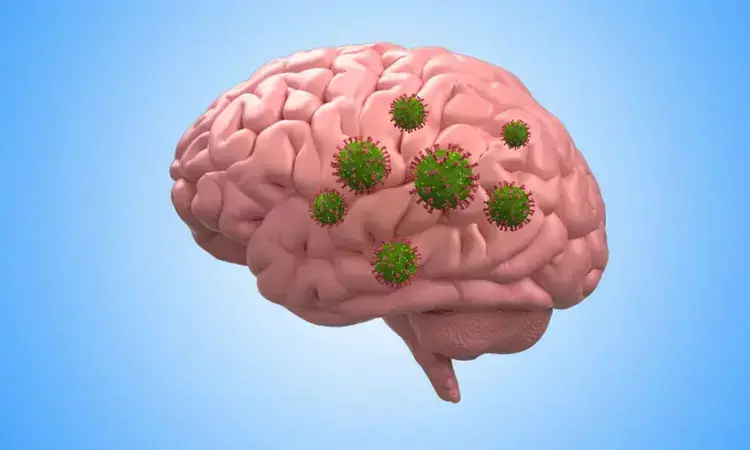- Home
- Medical news & Guidelines
- Anesthesiology
- Cardiology and CTVS
- Critical Care
- Dentistry
- Dermatology
- Diabetes and Endocrinology
- ENT
- Gastroenterology
- Medicine
- Nephrology
- Neurology
- Obstretics-Gynaecology
- Oncology
- Ophthalmology
- Orthopaedics
- Pediatrics-Neonatology
- Psychiatry
- Pulmonology
- Radiology
- Surgery
- Urology
- Laboratory Medicine
- Diet
- Nursing
- Paramedical
- Physiotherapy
- Health news
- Fact Check
- Bone Health Fact Check
- Brain Health Fact Check
- Cancer Related Fact Check
- Child Care Fact Check
- Dental and oral health fact check
- Diabetes and metabolic health fact check
- Diet and Nutrition Fact Check
- Eye and ENT Care Fact Check
- Fitness fact check
- Gut health fact check
- Heart health fact check
- Kidney health fact check
- Medical education fact check
- Men's health fact check
- Respiratory fact check
- Skin and hair care fact check
- Vaccine and Immunization fact check
- Women's health fact check
- AYUSH
- State News
- Andaman and Nicobar Islands
- Andhra Pradesh
- Arunachal Pradesh
- Assam
- Bihar
- Chandigarh
- Chattisgarh
- Dadra and Nagar Haveli
- Daman and Diu
- Delhi
- Goa
- Gujarat
- Haryana
- Himachal Pradesh
- Jammu & Kashmir
- Jharkhand
- Karnataka
- Kerala
- Ladakh
- Lakshadweep
- Madhya Pradesh
- Maharashtra
- Manipur
- Meghalaya
- Mizoram
- Nagaland
- Odisha
- Puducherry
- Punjab
- Rajasthan
- Sikkim
- Tamil Nadu
- Telangana
- Tripura
- Uttar Pradesh
- Uttrakhand
- West Bengal
- Medical Education
- Industry
Elevated gliosis index in brain after acute COVID-19 infection linked to depressive and or cognitive symptoms: JAMA

Canada: A case-control study revealed higher translocator protein distribution volume (TSPO VT), an index of gliosis, in COVID-DC (COVID-19 with persistent depressive and cognitive symptoms) patients.
The study, published in JAMA Psychiatry, showed elevation of TSPO VT in 20 patients with persistent depressive and cognitive symptoms after initially mild to moderate COVID-19 infection, compared with 20 healthy controls, more prominently in the dorsal putamen and ventral striatum. The TSPO VT in the dorsal putamen of COVID-19 cases is negatively associated with motor speed.
"These findings indicate that gliosis, particularly in the dorsal putamen and ventral striatum, may reflect injury, ongoing inflammation, or both and provide directions for further therapeutic development," the researchers wrote.
After COVID-19 illness, patients commonly face persistent depressive symptoms, often accompanied by cognitive symptoms (termed COVID-DC, DC for depressive and cognitive symptoms). Gliosis, an inflammatory change, was suspected in patients with COVID-DC but had not been studied in the brain for this condition.
Joeffre Braga, The Centre for Addiction and Mental Health, Toronto, Ontario, Canada, and colleagues aimed to determine whether translocator protein total distribution volume, a marker of gliosis that is measured with PET (positron emission tomography), is elevated in the ventral striatum, dorsal putamen, anterior cingulate cortex, prefrontal cortex, and hippocampus of after acute COVID-19 infection with sequelae of depressive and cognitive symptoms.
The study was performed at a tertiary care psychiatric hospital in Canada from 2021 to 2022. It compared TSPO VT of specific brain regions in 20 patients with COVID-DC with 20 healthy controls. Measurement of TSPO VT was done with fluorine F 18–labelled N-(2-(2-fluoro ethoxy)benzyl)-N-(4-phenoxypyridin-3-yl)acetamide ([18F]FEPPA) PET.
The TSPO VT was measured in brain regions, ventral striatum, dorsal putamen, anterior cingulate cortex, prefrontal cortex, and hippocampus. Symptoms were measured with psychological and neuropsychological tests, prioritizing outcomes related to striatal function. The study population included 40 participants (mean age, 32.9 years).
The authors reported the following findings:
- The TSPO VT across the regions of interest was more significant in persons with COVID-DC (mean age, 32.7 years; 60% were women) compared with healthy control participants (mean age, 33.3 years; 55% were women): mean difference, 1.51; 1.51 divided by 9.20 (17%).
- The difference was most prominent in the ventral striatum (mean difference, 1.97; 1.97 divided by 8.87 [22%]) and dorsal putamen (mean difference, 1.70;1.70 divided by 8.37 [20%]).
- Motor speed on the finger-tapping test negatively correlated with dorsal putamen TSPO VT, and the ten persons with the slowest speed among those with COVID-DC had higher dorsal putamen TSPO VT than healthy persons by 2.3 (2.30 divided by 8.37 [27%]).
"Our findings showed higher TSPO VT in patients with COVID-DC," the researchers wrote. "Greater TSPO VT is evidence for an inflammatory change of elevated gliosis in the brain of a patient with COVID-DC."
Gliosis may be consequent to injury, inflammation, or both, specifically in the dorsal putamen and ventral striatum, which may explain some persistent cognitive and depressive symptoms, including low motivation or energy, slowed motor speed, and anhedonia, after initially mild to moderate COVID-19 illness.
Reference:
Braga J, Lepra M, Kish SJ, et al. Neuroinflammation After COVID-19 With Persistent Depressive and Cognitive Symptoms. JAMA Psychiatry. Published online May 31, 2023. doi:10.1001/jamapsychiatry.2023.1321
Dr Kamal Kant Kohli-MBBS, DTCD- a chest specialist with more than 30 years of practice and a flair for writing clinical articles, Dr Kamal Kant Kohli joined Medical Dialogues as a Chief Editor of Medical News. Besides writing articles, as an editor, he proofreads and verifies all the medical content published on Medical Dialogues including those coming from journals, studies,medical conferences,guidelines etc. Email: drkohli@medicaldialogues.in. Contact no. 011-43720751


